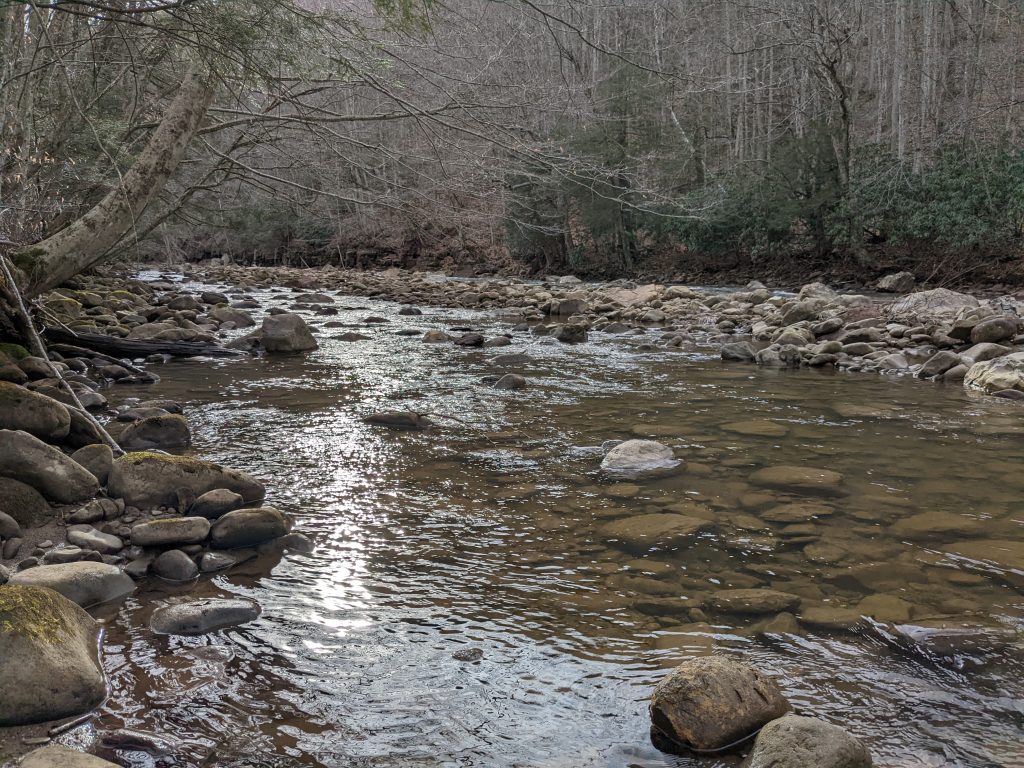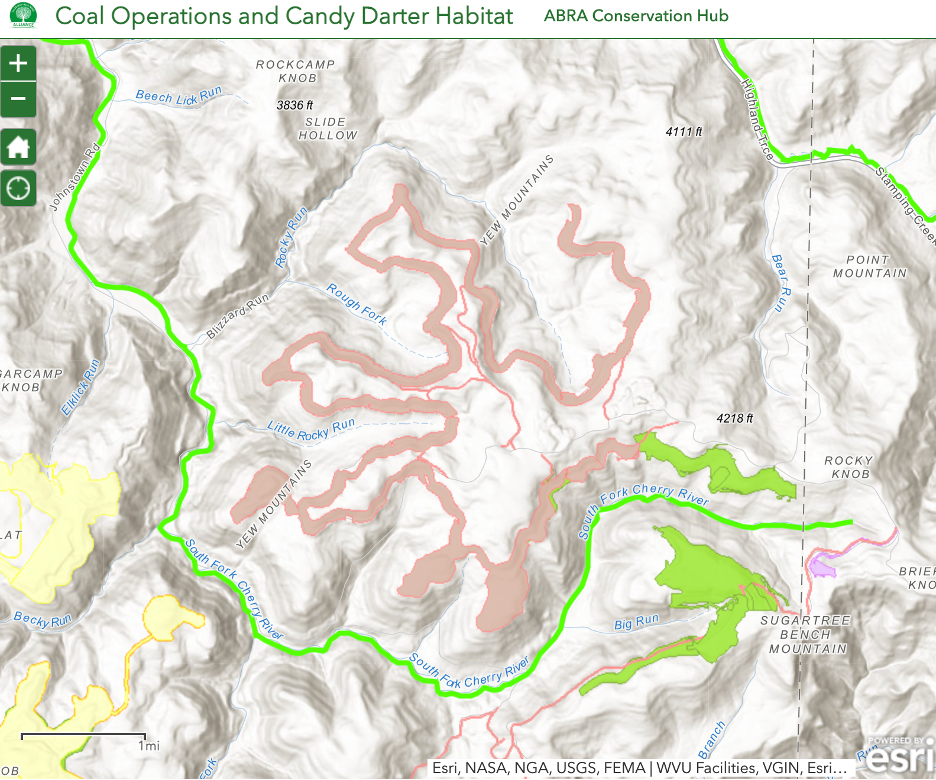
The South Fork of the Cherry River is considered critical habitat for the endangered candy darter. Photo by Willie Dodson
But despite a growing misperception that coal mining in Appalachia is a thing of the past, northern Greenbrier County has seen a proliferation of large, destructive surface mines over the past decade. The chief culprit is South Fork Coal Company, which has received permits to operate huge strip mines and construct associated infrastructure on nearly 3,300 acres here since 2012, adding to the roughly 550 acres of surface coal mining permits the company has held in Greenbrier County since the 1990s.
Surface mining of this scale is bad news for the environment even if it is conducted within the confines of the law, but South Fork Coal Company’s history of regulatory infractions is almost as egregious as Greenbrier County is beautiful. Since 2020, the company was cited 64 times by the West Virginia Department of Environmental Protection. Many of these citations were issued for failing to implement basic measures to reduce sedimentation of the South Fork of Cherry River and its tributaries — the primary threat to the endangered candy darter in this area.
A new program of the Allegheny-Blue Ridge Alliance aims to provide easy access to geospatial data about conservation imperatives and environmental threats in the Central Appalachian region of Virginia and West Virginia. The group calls the program the Conservation Hub. The environmental risks posed by coal operations in candy darter habitat is the focus of a newly posted Conservation Hub site and web map.

In this image from ABRA’s Conservation Hub interactive map, the South Fork of Cherry River is highlighted in bright green indicating designated critical habitat for the endangered candy darter. The 1,000+ acre Rocky Run Surface Mine is shown in pink, with other mining shown in green, purple, and yellow.
Rick Webb, ABRA’s executive director, describes the Conservation Hub as a community empowerment initiative.
“We work with our partners in the conservation community to provide public access to information needed for effective environmental review and oversight,” he said. “In the case of coal mining in critical habitat for the endangered candy darter, we are building a web map that documents the aquatic baseline and allows examination of past and current mining impacts in the watershed. This information is needed prior to consideration of further mining in the watershed.”
The sheer number of violations is not the only thing that is shocking about South Fork Coal Company’s history. It is also troubling how long many of these violations have gone uncorrected. The federal Surface Mining Control and Reclamation Act establishes a period of 30 days, which may be extended up to 90 days, during which most coal mining regulatory violations must be addressed. At the time of publication, at least four violations on South Fork Coal Company’s mines have been extended for over 14 months. In correspondence with the DEP, the company repeatedly pointed to bad weather as the justification for continually failing to correct these violations — an excuse DEP has accepted to this day.
It is worth noting that weather conditions did not stop the South Fork Coal Company from extracting 88,000 tons of coal from the 1,000-plus-acre Rocky Run Surface Mine over that same period of time. This gives the appearance that delays in correcting sediment control failures and other infractions has less to do with the weather and more to do with the company prioritizing quick revenue over environmental compliance.
None of this bodes well for the candy darter.

The endangered candy darter. Photo by U.S. Fish and Wildlife Service
Under the Endangered Species Act, projects that are federally funded or that require a federal permit must demonstrate that they will not harm any endangered species before they are allowed to break ground in a designated critical habitat area. In West Virginia, coal mines are permitted by the state Department of Environmental Protection, but this authority is delegated and overseen by federal agencies within the Department of the Interior. This means that South Fork Coal Company must follow not only those regulations that apply to all coal mines, but that it also must comply with the requirements of the Endangered Species Act at its operations in the South Fork of Cherry River watershed.
While ABRA maintains a focus on access to critical information, other organizations, including Appalachian Voices, take on a more direct advocacy approach. South Fork Coal Company is currently seeking approval by the state of West Virginia to discharge mine runoff from an additional 37 acres of mining and coal hauling disturbance into tributaries of the South Fork of Cherry River. As the impacts of the company’s present operations are extensive, multiple advocacy organizations are asking the DEP to deny this request and instead crack down on the company’s ongoing compliance problems. These organizations include the West Virginia Highlands Conservancy, West Virginia Rivers, Appalachian Voices, the Center for Biological Diversity, Coal River Mountain Watch, and Kanawha Forest Coalition.



What about filtering the water at the source and in the sediment ponds before it gets into our streams?
Check out https://www.amfsfiltration.com